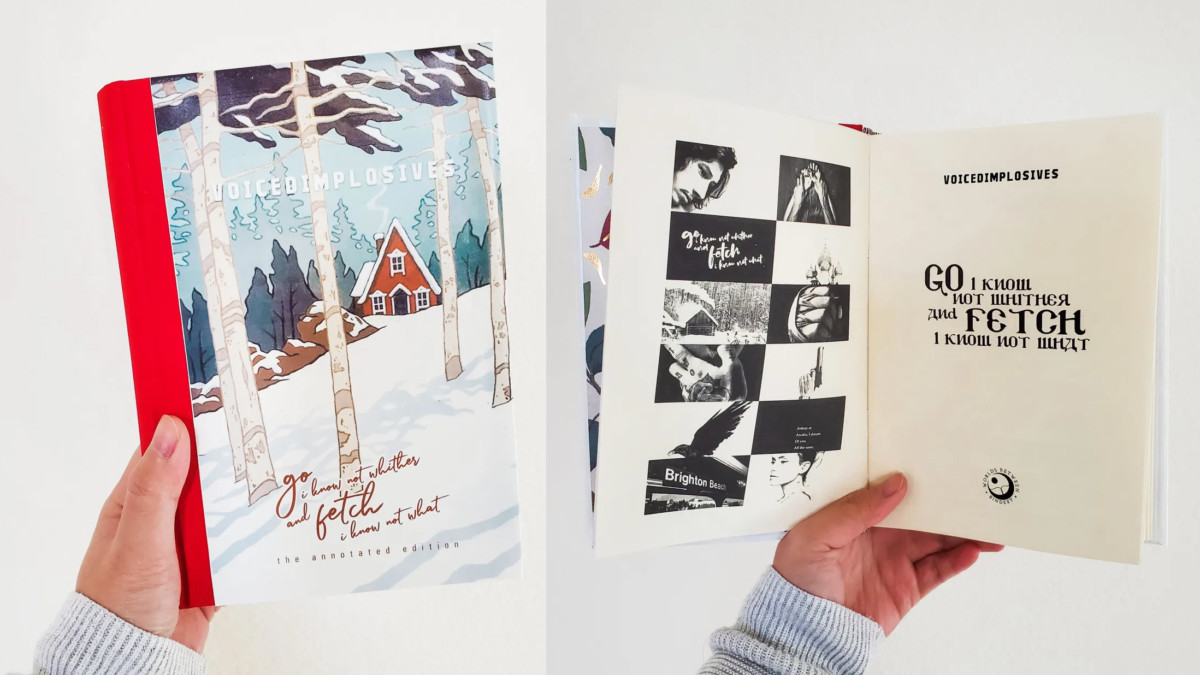Bespoke Fanfiction Bookbinding
Bookbinders are crafting beautiful, custom copies of works of fanfiction. Fanfiction is right on the border of what’s legal and what’s not, and the uptick in popularity of these bespoke books is an interesting exploration into this.
Bespoke fanfiction bookbinding, and how it began
For many fanfiction bookbinders, it started as a way to pass the time in quarantine, letting them learn a new skill and feel connected at a time when the entire world feels far away. One of social media’s most popular binders of fan fiction, Sam, aka omfgreyl, started out by gifting a physical copy of her favorite work to its author in March 2020. Commissions for her work have exploded since then.
There is an element of luxury to these books. Each page of binders such as Sarah Lesure’s books is meticulously crafted to convey an entire aesthetic and experience. Every part of the binding process is measured and exact: they work with their customers on color schemes and designs. It’s as much a business and a science as it is an art.
Different creators hate different parts of the process. Sam loathes the literal printer process; watching the pages come out, making sure that everything looks right and the printer doesn’t run out of ink. Lesure hates typesetting. She relied on DIY videos she found scrounging through YouTube, and nearly came close to quitting the first few times because of the difficulty. Graphic design students learn the skill in school, but without a teacher guiding a newcomer to the art form, like Lesure, it can be a daunting and exhausting task.
Legalities around fanfiction
When selling a book, both Lesure & Sam recover costs for materials and shipping, but can’t make a profit from it for themselves because of the layers of legal issues around fanfiction. Non-profits such as The Organization for Transformative Works (OTW) have been battling tirelessly to protect fanfiction and fan culture against publishing houses, production studios, and others claiming copyright infringement.
“There’s virtually no law on whether recouping costs qualifies as commercial or not,” Betsy Rosenblatt, a professor of intellectual property law at the University of California Davis and a member of the Organization for Transformative Works, told The Verge. “And when I say virtually no law, I mean no law. It just hasn’t come up. The reason it doesn’t come up is because if somebody is only recouping costs, they’re unlikely to generate a lawsuit.”
Li, a new fanfiction binder who operates an Etsy shop, comments in the original article that “the fanfic author doesn’t have the right to say it’s fine. The material still belongs to Warner Bros., Scholastic, Disney or whatever.” Lesure continues: “I love the enthusiasm for the concept of fanfiction as books, how crazy people go over it; it’s absolutely great. But especially on TikTok, the lack of legal understanding is very scary.”
Source: Making fanfiction beautiful enough for a bookshelf
Please Support us on Patreon!

Moreover, starting with the pledge level of $3, you will get a digitized vintage book about bookbinding, book history, or book arts each month from us!
These pledges help iBookBinding to continue its work and bring more information about bookbinding and book arts to you!


